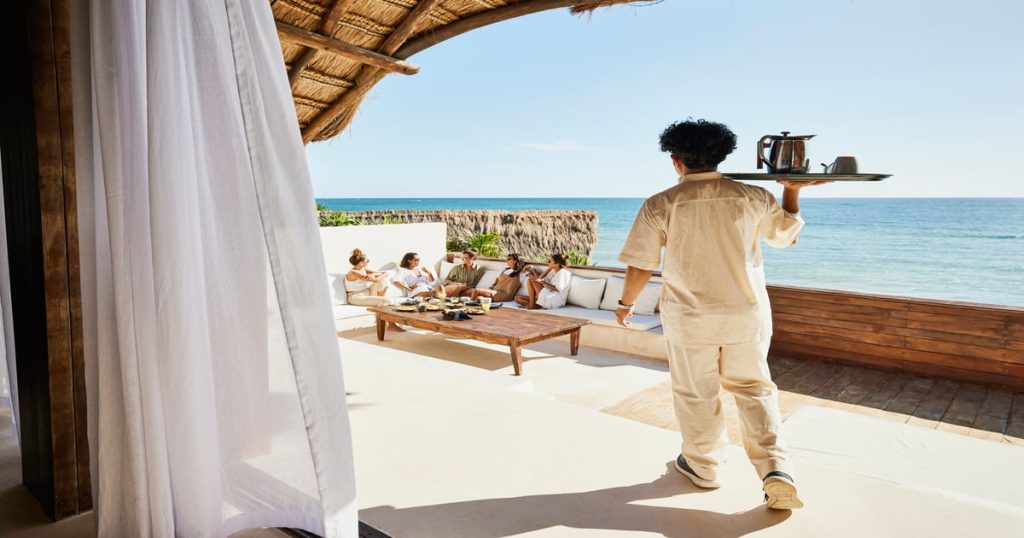Everything you need to know about resort development
5th July, 2024

A key growth driver in global tourism, resort development substantially contributes to job creation, revenue generation and regional advancement.
Forecasts indicate a positive annual growth rate of 4.7% in the global resort industry from 2020 to 2027, driven by the increasing demand for leisure and hospitality services. Resort development is a complex discipline, requiring meticulous planning, strategic design, procurement, construction, operations and marketing.
This guide covers everything you need to know about resort development, from planning a resort to effectively managing a thriving destination.
The resort development process: a step-by-step guide
Building a resort involves multiple stages, each crucial for creating a destination with a competitive edge and offering unparalleled guest experiences.
Initial planning and conceptual design
The first stage of the resort development process is creating a compelling concept and vision. Experts must identify a unique selling proposition that resonates with their target market and aligns with the resort’s location and surroundings.
Whether it’s a tropical paradise, a mountain retreat or an eco-friendly wellness resort, the concept should evoke a sense of wonder and excitement while addressing guests’ needs and preferences.
Local culture and sustainability should also be integrated into the design. Incorporating indigenous design elements, materials and craftsmanship adds authenticity and character to the resort, creating a sense of place that resonates with guests.
Meanwhile, sustainable design practices such as green building techniques, energy efficiency and water conservation help minimize environmental impact and support the long-term viability of the resort.
Understanding the market and feasibility studies
Resort developers also need to assess demand, competition and financial viability. This involves estimating construction costs, operating expenses, revenue projections and return on investment (ROI) calculations and identifying potential risks and opportunities.
They then devise financing strategies to secure funding for the project to cover these costs and contingencies.
This may involve a combination of equity financing, debt financing, government incentives and investor partnerships.
Infrastructure and public utilities requirements
Planning a resort means taking into account a wide range of factors including roads, water supply, sewage systems, electricity, telecommunications and other public utilities.
Resort developers must guarantee adequate infrastructure to support the resort’s operations and accommodate guests comfortably.
Collaborating with local authorities and utility providers is essential to address infrastructure needs and comply with regulatory requirements.
Zoning laws and environmental considerations
All resorts must follow land use regulations, building codes and environmental protection measures. The latter considerations are particularly important, as resorts can often have an impact on natural landscapes, ecosystems and habitats.
Developers must conduct impact assessments to evaluate the potential effects of the resort on the environment and mitigate negative impacts through sustainable design practices, habitat restoration and conservation initiatives.
Securing permits and addressing legal considerations
Obtaining necessary licenses and approvals is critical when building resorts. Developers must navigate a complex regulatory landscape, including zoning laws, environmental regulations, building codes and land use approvals.
Legal considerations include contractual agreements with contractors, suppliers, vendors, liability insurance and risk management strategies. Community engagement and public hearings may also be necessary to address local concerns and gain support for the project.
Construction phase: best practices and oversight
Project managers oversee subcontractors and suppliers to keep the development on schedule and within budget as well as for quality, safety and adherence to regulatory requirements. Regular site inspections, progress reports and stakeholder meetings can help identify and address issues or challenges as they arise.
Marketing strategies for new resorts
Publicizing the resort is essential for building brand awareness, attracting guests and driving bookings. With the right strategies, resorts can effectively reach their target audience and establish a strong presence in the competitive hospitality market.
Creating a strong brand identity for the resort
New resorts must be able to differentiate themselves and stand out from competitors. A strong brand identity centers on the resort’s personality, values and offerings. `
It must also identify the resort’s unique selling points, such as its location, amenities and guest experiences and communicate them effectively through branding elements that include logos, colors, typography and messaging.
Digital marketing tactics for promoting resorts
Developing effective hospitality digital marketing strategies is essential for reaching and engaging with prospective guests.
Resorts can use various digital channels and platforms to promote their offerings and attract bookings, such as search engine optimization (SEO), content marketing, social media marketing, paid advertising campaigns and email marketing.
How a hospitality school can help you build a career in a top hotel resort
It’s an exciting time for resort management and development and a hospitality degree provides an excellent launch pad for a thriving career in.
Through specialized courses and practical training, students gain insights into the hospitality industry’s unique demands. These programs often combine class-based learning with internships, providing hands-on experience in resort operations, guest services and event management as well as academic knowledge.
Hospitality schools also help aspiring professionals looking to build a resort career forge valuable connections with industry leaders and offer career services that aid graduates in securing positions in top hotel resorts.
They focus on technical and essential soft skills such as communication and problem solving, which are vital for success in a resort environment.
Operational excellence in resort management
Effective resort operations can help ensure every aspect of the guest experience is seamless, memorable and exceeds expectations.
Key components of effective resort operations
Successfully operating a resort relies on strategic planning, meticulous execution and continuous improvement. Key components include:
- Staff training and development: well-trained and motivated staff are essential for delivering exceptional guest experiences
- Guest services and communication: prompt and personalized services are vital for delivering an exceptional guest experience. Resorts should prioritize communication with guests, addressing inquiries, requests and feedback promptly and courteously
- Safety and security: resorts must protect guests, staff and property by implementing measures to safeguard them, including surveillance systems, emergency response procedures and training staff in crisis management and first aid
- Operational efficiency: resorts should look to streamline processes, implement technology solutions and implement best practices to improve operational efficiency in all departments
- Quality assurance and standards: ensuring guests receive the same level of excellence every time they visit means resorts have to consistently monitor and evaluate service delivery

Thomas Barwick / DigitalVision via Getty Images
Serious about your hospitality management career?
Insights on the latest industry trends, career development advice, and program releases from one of the world’s leading hospitality schools.
We respect your privacy. Unsubscribe at any time.
Hospitality services, amenities and guest experience
Central to successful resort operations is the focus on delivering memorable experiences and leaving a lasting impression on guests. This means providing a broad range of services, including:
- Recreational facilities and activities: hosting various recreational events and activities to cater to guests’ interests and preferences
- Dining and culinary experiences: providing diverse culinary options, including restaurants, cafes, bars and in-room dining and featuring local and international cuisines, signature dishes and innovative menus
- Wellness and spa services: offering a range of health and wellbeing amenities and treatments, including massages, facials, yoga classes and meditation sessions
- Entertainment and events: running a variety of options to engage guests and create memorable experiences
Innovations in resort management and technology integration
New technologies play a crucial role in resort operations and guest experiences. Among the more common innovations seen in resorts are:
- Mobile apps and digital concierge services: these allow guests to access information, make reservations and request services conveniently from their smartphones or tablets and receive personalized recommendations
- Contactless check-in and out: minimizing physical contact and improving safety and convenience for guests
- Smart room technology: automated lighting, temperature, entertainment and security controls to improve guest comfort and convenience
- Data analytics and personalization: using data and guest profiling allows resorts to personalize the guest experience and anticipate their needs and preferences
Financial aspects of resort development
Understanding the financial aspects of resort development allows developers to make informed decisions, secure funding and achieve a satisfactory return on investment (ROI).
Understanding costs, revenue streams and profit margins
One of the first steps in resort development is grasping the financial aspects of the project. These include:
- Upfront costs: land acquisition, design and construction
- Ongoing operating expenses: staff salaries, maintenance, utilities and marketing
- Revenue streams: room bookings, dining, entertainment, spa services, recreational activities and ancillary services
- Estimating potential revenue: assessing demand, analyzing market trends and projecting cash flows
- Profit margins: calculating gross and net margins for long-term profitability.
Developers scrutinize these aspects to ascertain financial viability, ensuring sustainable success in resort ventures
Financial planning is crucial in guaranteeing the project is adequately funded and has a clear path to profitability. Developers must identify investment sources, such as equity financing, debt financing, government grants, tax incentives and crowdfunding.
ROI calculations evaluate the financial performance of the resort project. This involves analyzing net income, cash flow, asset appreciation and payback period to determine whether the project meets investment objectives and provides satisfactory returns.
Mastering the financial aspects of resort development are crucial for success, but it can be difficult to get them right. With the right masters degree in hotel management, you can learn about what it takes to plan and deliver a profitable resort.
Providing access to industry leaders and professional internships, our master’s program gives you with everything you need to succeed in resort development

Challenges and risks in resort development
It’s common to encounter obstacles during a resort development project; navigating them requires careful planning, proactive management and strategic decision making.
Navigating regulatory hurdles and compliance issues
Local, state and federal regulations governing land use, zoning, environmental protection, building codes and permits can be complex and time-consuming to navigate. Developers must engage with multiple stakeholders, including government agencies, environmental groups and community members. Delays or denials in obtaining necessary approvals can impact project timelines and increase costs.
Managing construction delays and budget overruns
Other common challenges in resort development include building delays and sky-rocketing budgets, often resulting from unforeseen circumstances such as inclement weather, supply chain disruptions, labor shortages or design changes. Delays like these can also increase the overall cost of completing the project.
Mitigating environmental impacts
Preserving delicate ecosystems while constructing a resort can be logistically complex and expensive. Adhering to stringent environmental regulations often means higher costs and longer project timelines. Failure to address these challenges may result in irreversible damage to natural habitats, jeopardizing the resort’s sustainability and appeal to guests.
Case studies: successful resort developments
Resorts vary widely in size, location and target market, but some share common traits contributing to their success. Below, we’ll take a look at two leading resorts and the factors that make them work.
Atlantis Paradise Island
Located in the Bahamas, Atlantis Paradise Island is one of the world’s most iconic and successful resort developments. Situated on a sprawling 141-acre property, Atlantis offers a range of accommodations, amenities and attractions, including luxury hotels, water parks, marine exhibits and casino facilities.
Key factors contributing to its success:
- Unique concept and theme: inspired by the legendary lost city of Atlantis, the resort offers immersive experiences, including underwater ruins, marine habitats and themed attractions
- Varied amenities and attractions: the resort caters to guests of all ages and interests, making it a popular destination for families, couples and groups
- Location: situated on Paradise Island in the Bahamas, Atlantis benefits from its stunning natural surroundings, including pristine beaches, crystal-clear waters and tropical landscapes
Amanpulo
Situated on a secluded private island located in the Philippines, Amanpulo is renowned for its exclusivity, privacy and luxury. The Sulu Sea location allows the resort to offer tranquility and natural beauty, with pristine beaches, lush forests and panoramic ocean views.
Key factors contributing to its success:
- Exclusivity and privacy: its location and limited number of accommodations provide guests with a sense of seclusion
- Commitment to sustainability: the resort is committed to sustainability and environmental conservation
- Exceptional service and hospitality: Amanpulo is renowned for making sure that every guest is given world-class assistance and amenities while there
Lessons learned from these developments
Looking at the case studies of Atlantis Paradise Island and Amanpulo, some key takeaways for resort developers emerge, including:
- Developing a unique concept and theme that resonates with target guests can differentiate a resort and create a memorable experience
- Offering a diverse range of amenities and attractions helps the resort appeal to a broad audience
- A strategic location with natural beauty and accessibility can increase a resort’s appeal and attract international travelers
- Providing exclusivity and privacy through low-density design and personalized service appeals to travelers seeking seclusion
- Prioritizing sustainability and environmental conservation demonstrates a resort’s commitment to responsible tourism practices and increases its appeal to eco-conscious travelers
- Exceptional service and hospitality are essential for guest satisfaction, loyalty and repeat visits
The future of resort development
Resorts have evolved to integrate entertainment, dining, wellness and recreational activities. As the hospitality industry continues to evolve, the future of resort development is shaped by the following trends:
- Sustainability: resorts are increasingly incorporating eco-friendly practices and green technologies to minimize environmental impact and promote conservation
- Technology: from mobile check-in and keyless entry systems to virtual concierge services and personalized guest experiences, resorts are using technology to improve convenience, efficiency and personalization
- Consumer preferences: today’s travelers want authenticity, immersion and meaningful experiences beyond traditional leisure activities. Personalization, customization and flexibility are also increasingly important
Conclusion
There are many superb resorts across the globe offering not just accommodation but unique experiences that attract travelers from far and wide. They each play an important role in hospitality by supporting economic growth and providing memorable experiences. But while the future looks strong for resort development, creating a successful resort requires a multifaceted approach, including meticulous planning, sustainable design, effective marketing and operational excellence.
A resort’s success relies on strong market research, regulatory compliance and financial viability. Looking ahead, technological innovation and sustainability trends will continue to influence the evolution of resorts to meet the ever-changing preferences of today’s travelers.
If you want to pursue a career in resort management or run your own hotel, consider pursuing a hospitality degree from a renowned hospitality school such as Les Roches. While you may encounter challenges along the way, by gaining expertise in the fundamentals of resort development and following the strategies set out in this guide, you can look forward to carving out a rewarding career while working in some of the most stunning destinations in the world.
While likely to be exciting and rewarding, a successful resort development career requires the right skills and qualifications. Pursuing a master’s degree in hotel management will equip you with the expertise needed to excel and succeed in this dynamic and lucrative field.
Main Image: Martin Puddy / DigitalVision via Getty Images
